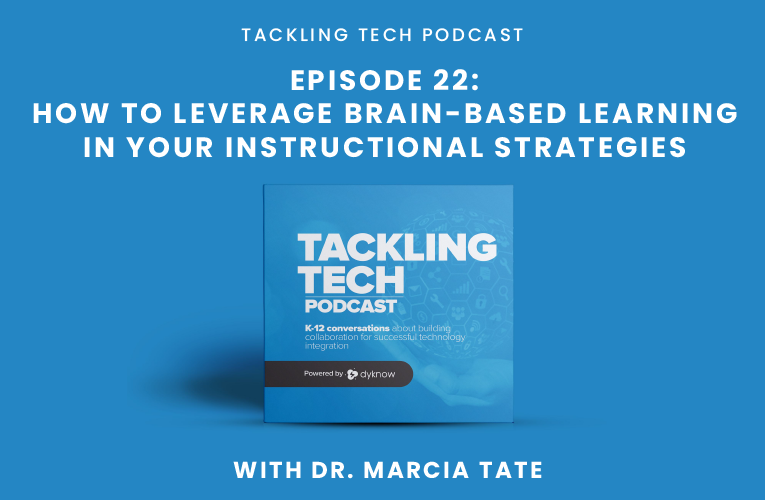On this episode of Tackling Tech Podcast, powered by Dyknow, Brett McGrath talks with Dr. Marcia Tate, bestselling author of Worksheets Don’t Grow Dendrites: 20 Instructional Strategies to Engage the Brain. These brain-based strategies include drawing, discussion, movement, and storytelling, and are backed by extensive research and science and encourages social-emotional learning.
Listen to Episode 22:
Available wherever you listen to podcasts:
Connect with Dr. Marcia Tate:
Don’t have time to listen to the episode? Here’s a peek at what’s inside…
Dr. Marcia Tate’s Career in K-12 Education
This is Dr. Marcia Tate’s 47th year in education. She started as a classroom teacher at the elementary level and then became a reading specialist helping students with reading problems. From there she became the Professional Development Coordinator at DeKalb County School System in Decatur, Georgia, and worked there for a total of 30 years before leaving. When she left, she was the Executive Director of Professional Learning.
Marcia is passionate about professional development and explained that it is her forte because of her tenure in the field. She shared:
“The best way that we can improve academic achievement for all students, is to improve the efficacy of teachers”
Brain-Based Learning
Professional development is not Marcia’s only passion. She is also extremely passionate about brain-based learning strategies and educating teachers on how to implement these strategies in their classrooms.
About 20 years ago, Marcia took years of brain research and learning style theory that she’d be focused on and put together 20 strategies that correlate with the ways the brain learns best. These strategies can all be found in her book: Worksheets Don’t Grow Dendrites. This book has received great feedback from educators all over the world.
Even during this time of remote learning, Marcia has received thousands of emails from teachers voicing their appreciation for her brain-based strategies which have helped guide them through remote learning.
Advice for teachers as they go back to school
Marcia’s biggest piece of advice for teachers as they prepare to go back to school in the Fall is to stay positive.
She explained that being positive during this time is of the utmost importance – especially during a time when it can be so easy to be negative. Through brain research, Marcia has learned that when the brain is in a state of crisis or high stress, it does not retain information and becomes very difficult to learn anything.
This is the state that most people are under during COVID-19, so it is easy to become negative. Maintaining a positive mindset allows both students and teachers to learn better and retain more information.





